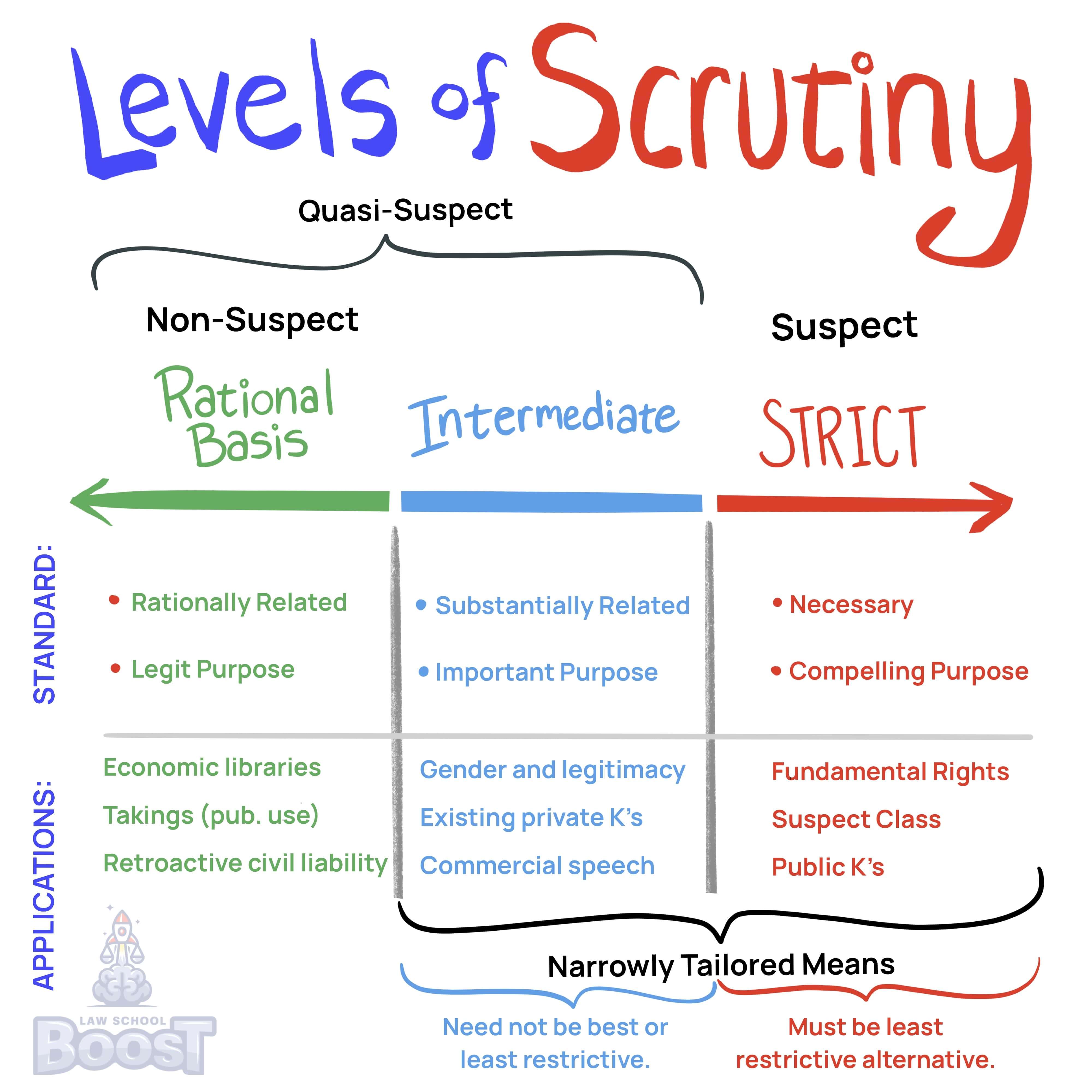🇺🇸
Constitutional Law • Levels of Scrutiny
CONLAW#059
Legal Definition
Government action is upheld if it is rationally related to a legitimate government purpose. The burden is on the challenger, who needs to prove only some conceivable legitimate purpose. This test is highly deferential to the government, and the action is usually valid unless it is arbitrary or irrational.
Plain English Explanation
Imagine you're a teacher and you make a rule that students can't wear hats in class because it might block other students' view. This rule might seem small, but you have a reason: to make sure everyone can see the board clearly. The Rational Basis Test is kind of like this. It's a test the law uses to check if the rules the government makes have good reasons behind them, even if the reasons are simple. The idea is to make sure the government isn't making rules that don't make any sense at all. So, if someone thinks a rule is unfair, they have to show that the rule really doesn't have any good reason behind it. Most of the time, the government's rules are seen as okay because they say they're trying to make things better or solve a problem, and all they need is a reason that isn't completely made up. This test shows that sometimes, the government just needs a bit of logic behind its decisions, not a perfect solution.
Hypothetical
Hypo 1: Bob owns a bakery in Hypofornia where a new state law requires all bakeries to display a sign stating, "This establishment uses ingredients that may cause allergies." Bob believes this law unfairly targets his business and sues, claiming it violates his First Amendment rights by forcing him to speak against his will. Result: The court upholds the law, finding it is rationally related to the legitimate government purpose of public health and safety. The requirement to inform customers about potential allergens is deemed a reasonable measure, thus not violating Bob's First Amendment rights because the state has a legitimate interest in consumer safety.
Hypo 2: Hypofornia enacts a law requiring all pet owners to vaccinate their pets against a specific disease. Bob, an anti-vaccination pet owner, sues, arguing this law infringes on his substantive due process rights under the 14th Amendment to make medical decisions for his pets. Result: The law is upheld because it is rationally related to the legitimate government purpose of preventing disease outbreaks among pets. The court decides that the public health benefit outweighs Bob's claim of infringement on his rights, demonstrating a rational basis for the regulation.
Hypo 3: Bob's political party, the Free Speech Party, wants to hold a rally in a public park in Hypofornia. The state denies the permit, citing a law that prohibits political rallies in public parks to maintain neutrality. Bob sues, claiming the law violates the Free Speech Clause of the First Amendment. Result: The Rational Basis Test does not apply here because this is a case involving a fundamental right - freedom of speech. The court applies strict scrutiny (which you'll learn about in another card) and finds the law unconstitutional because it directly restricts political speech, a core protected activity, without a compelling government interest or being narrowly tailored to achieve such an interest.
Hypo 2: Hypofornia enacts a law requiring all pet owners to vaccinate their pets against a specific disease. Bob, an anti-vaccination pet owner, sues, arguing this law infringes on his substantive due process rights under the 14th Amendment to make medical decisions for his pets. Result: The law is upheld because it is rationally related to the legitimate government purpose of preventing disease outbreaks among pets. The court decides that the public health benefit outweighs Bob's claim of infringement on his rights, demonstrating a rational basis for the regulation.
Hypo 3: Bob's political party, the Free Speech Party, wants to hold a rally in a public park in Hypofornia. The state denies the permit, citing a law that prohibits political rallies in public parks to maintain neutrality. Bob sues, claiming the law violates the Free Speech Clause of the First Amendment. Result: The Rational Basis Test does not apply here because this is a case involving a fundamental right - freedom of speech. The court applies strict scrutiny (which you'll learn about in another card) and finds the law unconstitutional because it directly restricts political speech, a core protected activity, without a compelling government interest or being narrowly tailored to achieve such an interest.
Visual Aids



